 In the passage of Paul VI which has been quoted that Pope said that the Camillians should be ‘the lived apologetics of delicacy, disinterestedness and heroism, if this is necessary, of those who have made the example of Jesus the Lord the only reason for their entire lives, the measure of a measureless need, the secret spur of an impetus destined to come to an end only with death’.
In the passage of Paul VI which has been quoted that Pope said that the Camillians should be ‘the lived apologetics of delicacy, disinterestedness and heroism, if this is necessary, of those who have made the example of Jesus the Lord the only reason for their entire lives, the measure of a measureless need, the secret spur of an impetus destined to come to an end only with death’.
It is not difficult for me to see in Fr. Rebuschini the ‘apologist of delicacy’, a reflection of the goodness that came to him from his heart, free from any kind of detachment from people, from antipathy and from hostility. This was not an innate talent. To have possessed it to the point of it seeming something natural to his person had cost him a long ascetic exercise. In the notebook mentioned above, at the age of twenty-seven, five months before he joined the Camillians, he observed in himself bursts of impatience; a lack of resolution to be always loving and not to trouble others with a sad face; feelings of irritation (of an internal character alone as well); a tendency to judge; an aversion to hard work of the spirit; and internal acts of dislike. During his novitiate he sought to acquire the aptitude of being lovable which he also called affability as an ornament of the spirit of service, that is to say of implemented charity.
The apologetics proposed by Paul VI evoked what John XXIII asked of the Camillians of Lombardy and Veneto: to be ‘happy, lovable and very human’.
That this was how Fr. Rebuschini was is the shared opinion of those who knew him. Fr. Moar – as is known – when testifying about Fr. Enrico did not use the term ‘heroism’. He did not like it, probably because it evoked for him the ancient mythological heroes, who were seen as demigods, or a kind of unreachable holiness, amplified by the rhetoric of preachers or the fanaticism of people. He preferred the term ‘exemplarity’. But within this exemplarity he ‘outlined a picture of human and religious virtues that was more than honourable. The direction of Fr. Enrico was permeated by goodness and perseverance…His ascendancy lay in the tacit example. He was esteemed and liked in Cremona and elsewhere; he treated people with a great deal of refinement; he was faithful to his word; he knew how to be meek and indulgent; his external appearance reflected his internal composure and order…always balanced as he was’.
He could not have describes in a better way this singular ‘apologete of delicacy’ who reminds us of Manzoni’s words: ‘a sincere apologist for a law whose goal is love’ (referred to Cardinal Borromeo).
Sister Faustilla Pernechele, the Superior General of the Sisters of Mercy, had memories of Fr. Enrico which could not be removed. He had been her spiritual guide in Cremona where she had arrived as a young sister going through her first experience as a professed religious. He directed her during her life and supported her in her loving devotion to the sick. After fifty years she remembered him as a model of delicacy, of respect and of devotion to the sick. ‘He treated everyone’, observed his cousin Virginia Casati, ‘with charity and infinite sweetness’. Giovanni Vergottini stated: ‘He treated everyone with great sweetness’. A radiologist of the house, Dr. Vergani, declared: ‘In my relations with him because of his activity I always admired his perfect correctness. In all the meetings I had with him I always found him in the same mood, serene, kind and understanding. And this behaviour was the object of a great deal of admiration inasmuch as I knew that the house had serious difficulties and the responsibilities of the father were demanding’.
Let us now seek to illustrate such ‘apologetics of delicacy’ with reference to the spiritual school on which Rebuschini based himself and the religious model on which he drew – the rich wellspring of the Founder. This was one of the principles of the formation that the house of the novitiate transmitted to him and it was in line with the invitation that Paul addressed to the faithful of Philippi: ‘Your affability should be known to everyone’. This at least is how the Bible of the Italian Bishops’ conference translates epikia. We could translate it with sociability, accessibility, courtesy, nobility of character. Spick translates it with ‘pleasant balance’. Epikia means fairness; being fair with everyone. In classical Greek it often expressed honourableness, the rectitude of a person, it defined good men, referred to the rectitude of their discernment, was expressed in a sense of proportion, in kindness, kindliness, courtesy, a harmonious propensity to relationships with other people, to reconciling and moderate feelings, to indulgence in the face of the weaknesses of other people, to a readiness to remember the good that has been done to us rather than the wrong, the benefits that have been received rather than the services that we 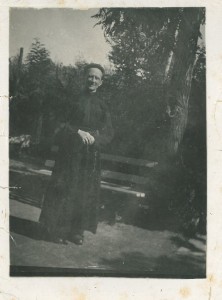 have rendered, and to emphasise dialogue rather than impose oneself, in order to find a shared point when opinions diverge. An invitation to affability is a recurrent theme in St. Paul: ‘I, Paul, myself entreat you by the meekness and gentleness of Christ’ (2 Cor 10:1); ‘Remind them…to be gentle, and to show perfect courtesy towards all men’ (Ti 3:2); ‘a bishop….must not be arrogant or quick-tempered…but hospitable, a lover of goodness, master of himself (ibid., 1:7-8); ‘But the wisdom from above is pure first of all; it is also peaceful, gentle and friendly (Jm 3:17). Christian spirituality requires a balanced character, a moderation that makes it understandable, good grace that adapts to all characters, conduct that is based on order, and adherence to the rules of good manners. ‘But all things should be done decently and in order (1 Cor 14:40). ‘I am with you in spirit, rejoicing to see your good order and the firmness of your faith in Christ’ (Col 2:5).
have rendered, and to emphasise dialogue rather than impose oneself, in order to find a shared point when opinions diverge. An invitation to affability is a recurrent theme in St. Paul: ‘I, Paul, myself entreat you by the meekness and gentleness of Christ’ (2 Cor 10:1); ‘Remind them…to be gentle, and to show perfect courtesy towards all men’ (Ti 3:2); ‘a bishop….must not be arrogant or quick-tempered…but hospitable, a lover of goodness, master of himself (ibid., 1:7-8); ‘But the wisdom from above is pure first of all; it is also peaceful, gentle and friendly (Jm 3:17). Christian spirituality requires a balanced character, a moderation that makes it understandable, good grace that adapts to all characters, conduct that is based on order, and adherence to the rules of good manners. ‘But all things should be done decently and in order (1 Cor 14:40). ‘I am with you in spirit, rejoicing to see your good order and the firmness of your faith in Christ’ (Col 2:5).
Delicacy as a feature of the countenance is an expression of respect for people. St. Camillus described it in the form of maternal affection (tenderness); of lovingness (benevolence, concern); agreeableness (joviality, good manners); meekness (goodness, welcome, docility); respect (delicacy, reverence); diligence (assiduousness, solicitude); and charity (this word is employed seventeen times in Ordine et Modi che si hanno da tenere in servire gli poveri infermi). Affability certainly was not at home in the hospital of the Holy Spirit to judge by the testimony of the epoch. St. Camillus required it because of the positive and warm concern that was due to a patient as a person in pain. His religious had to grasp that nobody was without hidden value. The sick in front of their eyes were people who possessed something that was valuable that could escape superficial observation. God does not look at the bad sides of people, a Hassidic maxim declares, and we must do the same. When reading the accounts written by Fr. Enrico we will in vain look for negative judgements or assessments in relation to people and their behaviour. Rather, he highlights their positive sides, the contributions of their talents to the good ordering of the house, and the religious spirit that animates them. And for everyone he had words of praise and gratitude, transparent and sincere words.
Isaiah foretold of the Messiah that ‘He will not cry or lift up his voice, or make it heard in the street; abruised reed he will not break, and a dimly burning wick he will not quench’ (Is 42:2-3). This was how Fr. Rebuschini was: he acted with meekness, magnanimity, with the strong sweetness of somebody who wanted to be for everyone a man of peace. This was the style of the mysterious servant of Jehovah. It was the humble and meek attitude of someone who did not exhibit himself, who drew near to the weak with respect and delicacy. It is poor weekday deeds, submerged whispered words, and subtle attention, that give life. Where suffering bends it and worry extinguishes it, only a sign of understanding opens anew to hope. The Talmud declares: ‘Who will inherit the world to come? The meek and the humble, he who bends when he comes in and when he goes out’. The world to come is given beforehand to the meek, who possess the earth, the grim pathway of access to the hearts of other people, and the peaceful solution to even the gravest problems.
This singular ‘delicacy’ – to what was it due? To his natural temperament, that is to say the genetic code that everyone bears within them? To the ascetic exercises of his youthful years, to which reference had already been made? To his constant dialogue with the word of God, by which he allowed himself to be pervaded and shaped? To the school of Heaven which at that time had as its teachers Fr. Sommavilla and Fr. Rocco? To the school of St. Ignatius who created religious personalities who were marked out by their meekness and great goodness of spirit as well? Probably because of all these causes put together whose propulsive element was a constant dynamic towards the best, the most perfect. But there is another reason which contributed in a singular way to making him the apologist of delicacy: the suffering that he personally experienced those four times that he personally had to suffer depression. Those who have experienced depression or those who have had to manage it in their community group know how painful it is and how much it leads to despair. ‘He provoked compassion in me’, said Fr. Filippi at the processes.
The concept is the following: after experiencing what it is to suffer he became delicate and understanding when faced with the suffering of other people. There is a teaching in suffering. Suffering is a school. And Fr. Rebuschini gathered fruit from it, refining his spirit and polishing his character – which led him to studies, prayer and to solitude, to an aptitude for delicacy, for understanding and for love. When one draws near to pain, one draws near to a mystery. In asking questions of his experience, he became meek and approachable, and had that refinement of the countenance that marks out noble and holy souls.



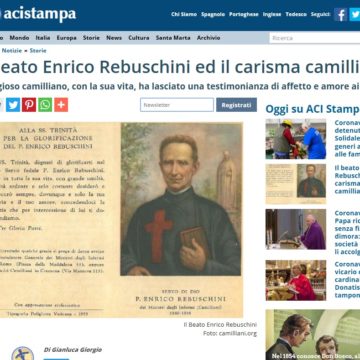
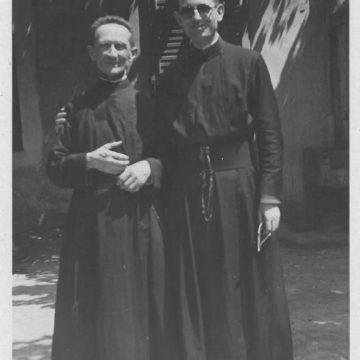


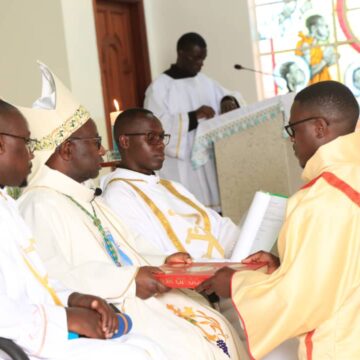
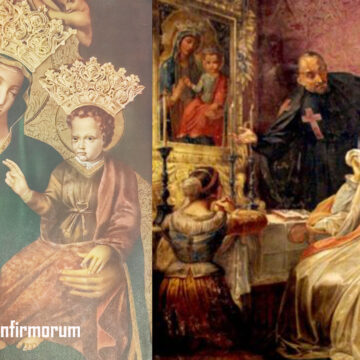

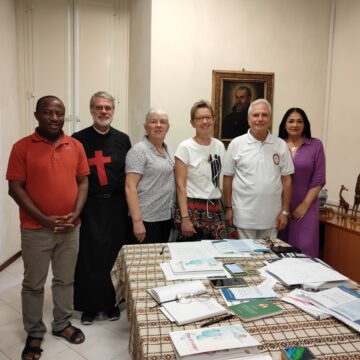

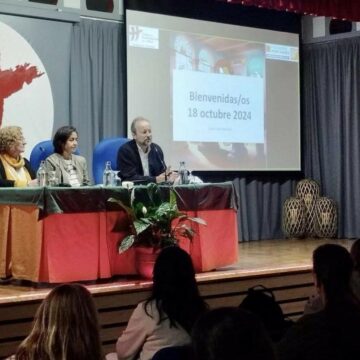

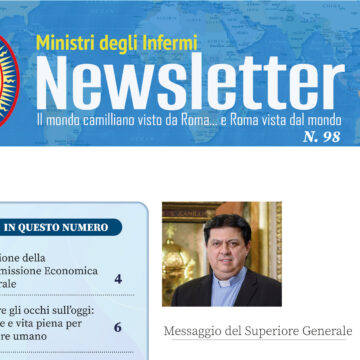
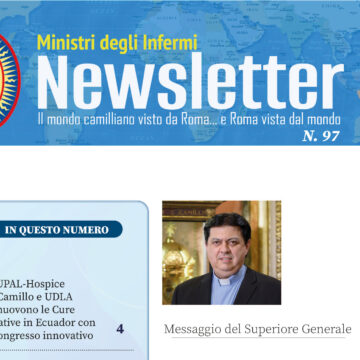
Camillians on Facebook
Camillians on Twitter
Camillians on Instagram